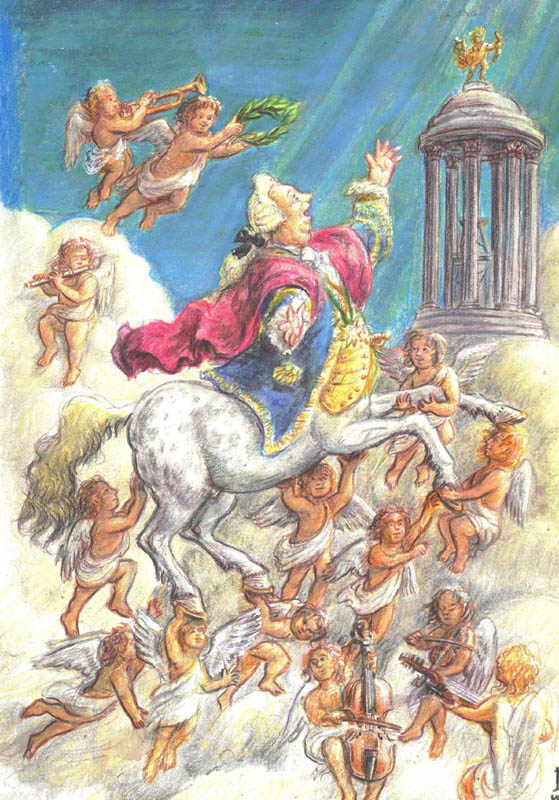 |
 |
"THE APOTHEOSIS OF SIG: ZOCCOLETTI" When last we left him, Zoccoletti was at his peak of fame: lionized in operatic circles, fawned over by the fair sex, lavished with gifts (the Duchess of Ferrara was rumored to have given him a set of solid-gold shoes set with emeralds. He never wore them, however; preferring to use ordinary iron shoes gilded over). Yet, he could not escape the basic tragedy of his life: no amount of human attention would replace the capacity for love he had lost in his colthood. He threw his attention, therefore, to his musical career; and attempted to create an all-centaur operatic company, which might carry on his legacy. He started work on a libretto and score of his own, titled le Nozze di Piritou, and persuaded the officials of S. Epona to lend their best singers for the production. Tragedy ensued, however, when, during rehearsal, the stage collapsed under the combined weight of the cast and chorus, killing five of them and seriously injuring the rest. Zoccoletti, who had been standing in the orchestra, was unhurt; but the theater owners, along with the City magistrates, imposed a heavy fine upon him, together with massive reparations to the victims' families. Furthermore, an ordinance was passed banning centaurs from the public stage; in order to prevent any future disasters of this kind. His public career at an end, and seriously strapped for cash, Zoccoletti sought out the noblewomen who had so recently adored him. Only a few diehards chose to ignore the recent reaction against him (and against centaurs in general: the Church was seriously considering removing their support from the parish of S. Epona, and banishing the species from the City). His only means of income lay in giving private concerts at these few select houses; even then, the fees he received were not nearly as lavish as before. It was not until the fifth Baroness of Uffington chanced to attend one of these recitals, that Zoccoletti found his last, and most devoted, patron. The prospect of steady employment delighted him; and he readily agreed to make the journey to England. But once there, he found himself caught between the Baroness's possessive adoration and her husband's jealousy. The Baron, a rustic nobleman of the deepest dye, looked askance at his wife's infatuation with what he called "this Italian Creature, not even half a Man"; and more than once threatened to have Zoccoletti slaughtered and fed to the hounds. Aside from the occasional dinner-party and concert with the Baroness's lady friends, and his duties as music master to her children, he found his only solace in eating and drinking. As may be imagined, he gained a good deal of weight (a problem also common to other castrati). This proved to be his undoing; one night in the autumn of 1744, after a surfeit of apples and alfalfa, Zoccoletti was seized by an attack of colic. By next morning, the "Celestial Gelding" was no more. Upon hearing the news, the Baroness immediately ordered the servants to carry his body out, and bury him under the utmost secrecy; fearing that her husband might do what he had so often intimated. The Baron, enraged to the point of apoplexy, collapsed with a stroke; he died several days later. |


